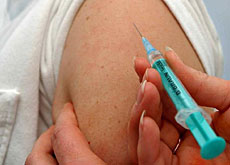Health officials want higher vaccine take-up rate

The Federal Health Office wants thousands more young people to be immunised under a childhood vaccination programme.
It warned that these diseases could once again gain a deadly foothold if more children were not inoculated.
Launching a nationwide information campaign in Bern on Monday, health officials said they would like 90-95 per cent of children and young adults to be vaccinated against a range of potentially fatal diseases.
Currently, about 80 per cent of people in Switzerland are immunised against measles, mumps and rubella (MMR), diptheria, tetanus, polio, pertussis (whooping cough), Haemophilus influenzae type B (Hib), and Hepatitis B between the ages of two months and 15.
“We know that vaccines and vaccinations in the past have been a success story,” Dithelm Hartmann, deputy director of the Federal Health Office, told swissinfo.
“We know that if the acceptance of vaccination in the general population falls below 80 per cent, then new dangers arise as has been demonstrated in a number of epidemics both inside and outside Switzerland.”
Killer potential
In the late 1990s, there were 150,000 cases of diphtheria including 4,000 deaths in countries of the former Soviet Union because of a slackening of the vaccination programme.
Outbreaks of polio in the Netherlands in the early 1990s and whooping cough in the late 1970s in the United Kingdom also demonstrate the killer potential of these diseases.
Before the introduction of vaccinations in Switzerland, every year saw about 3,000 cases of diphtheria, 200 cases of meningitis through Hib as well as 700 cases of polio resulting in 80 deaths and about 50 deaths from tetanus.
“After vaccinations were introduced, the numbers declined dramatically,” said Hartmann.
A jab too far
Hartmann accepted that vaccination carried some risks but said fears were vastly exaggerated. “The risk is very low compared with the risk of really living through the disease itself,” he said.
Federal health office statistics show that allergies against the Hepatitis B vaccine occur in one case out of 600,000 while the risk of contracting MMR is reckoned to be between 200 and 1000 times higher if children are not vaccinated.
There has been considerable debate in the past year about links between the triple MMR vaccine and autism.
“We are following this very carefully and seriously,” said Hartmann. “We are however very relieved that scientific studies have clearly shown that a [link] between the vaccination and the occurrence of autism has not been confirmed.
“Autism in developed societies is on the rise but this is independent of vaccination for MMR.”
Shot in the arm
Inoculation doesn’t only offer individual protection but is part of international efforts to eradicate these diseases.
The health office reckons that the cost of the vaccination programme per child is about SFr500.
“If a child or young adolescent falls ill with tetanus, the treatment can cost tens of thousands of francs,” said Hartmann.
The federal and cantonal health authorities are investing SFr600,000 a year in the information campaign. The initiative is supported by the Swiss Medical Association.
“We want really to inform parents who need information and to inform doctors so that on the level between physician and the parent there will be a good dialogue with good information so that a good decision can be based on that,” said Hartmann.
swissinfo, Vincent Landon
The Federal Health Office wants 90-95% of children vaccinated against a range of potentially fatal diseases.
Currently, some 80% of Swiss are immunised against diseases such as measles, mumps and rubella and diptheria.
The vaccination scheme costs around SFr500 per child.

In compliance with the JTI standards
More: SWI swissinfo.ch certified by the Journalism Trust Initiative









You can find an overview of ongoing debates with our journalists here . Please join us!
If you want to start a conversation about a topic raised in this article or want to report factual errors, email us at english@swissinfo.ch.